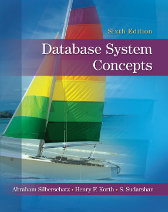Suggested Syllabus for a One Semester Applications Oriented Course
The following syllabus is designed for a course where the goal is to teach students how to use databases to construct applications. Details of database internals are kept to the minimum.
- Chapter 1: Introduction
- Chapter 2: Introducation to the Relational Model
- Chapter 3: Intoduction to SQL
- Chapter 4: Intermediate SQL
- Chapter 5: Advanced SQL
- Sections 5.4 onwards can be deferred or omitted.
- Chapter 6: Other Relational Languages
- Sections 6.1 (Relational Algebra) may be covered in brief.
- Sections 6.2 (Tuple Relational Calculus) and 6.3 Domain Relational Calculus) may be omitted.
- Chapter 7: Entity-Relationship Model
- Chapter 8: Relational Database Design
- Chapter 9: Application Design and Development
- Chapter 10: Storage and File Structure
- Sections 10.3 (RAID), 10.4 (Tertiary Storage) and 10.8 (Database Buffer) may be omitted if desired.
- Chapter 11: Indexing and Hashing
- Cover only Sections 11.1 through 11.3 (B+-tree Index Files) with a brief outline of Section 11.5 (Multiple Key Access) and 11.6 (Static Hashing), and the idea of Dynamic Hashing.
- Chapter 12: Query Processing
- Section 12.1 (Overview) should be covered. We suggest you cover Section 12.2 (Measures of Query Cost) as well as Section 12.5 (Join Operation) as far as time permits.
- Chapter 14: Transactions
- Chapter 20: Data Warehousing and Mining
- We do not recommend covering this chapter in detail, but students should be to the concepts covered here, and in Section 5.6 (OLAP) and the chapter may be used as self-study material.
- Assignments/Project
The course should be supplemented by assignments and a project. The assignments are to get students familiar with using databases, running queries and using application development tools.The project could involve the design of a schema for a realistic application, and the implementation of the entire application using SQL and language/APIs such as Java servlets/JSP, C# ASP, or PHP. See Chapter 9 for some suggestions on project topics.
Last updated November 2009.
 Database System Concepts
Database System Concepts